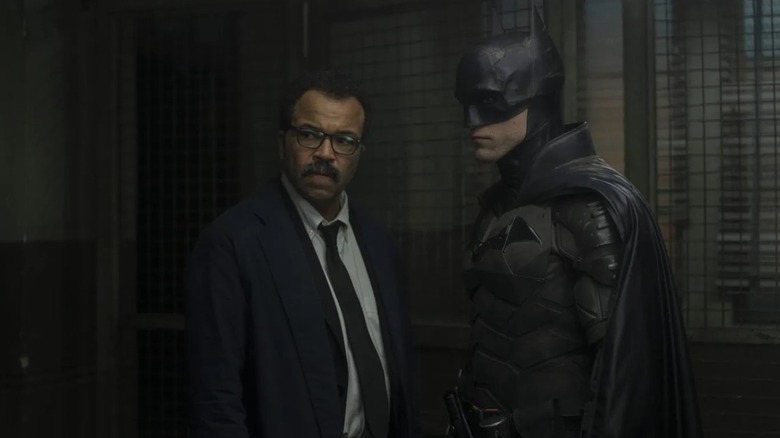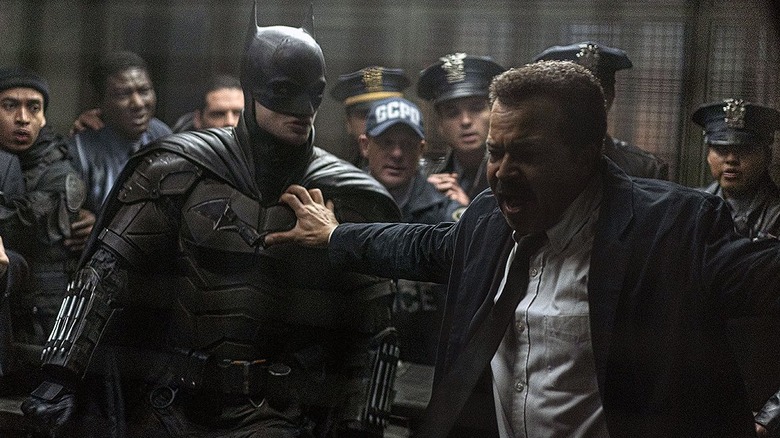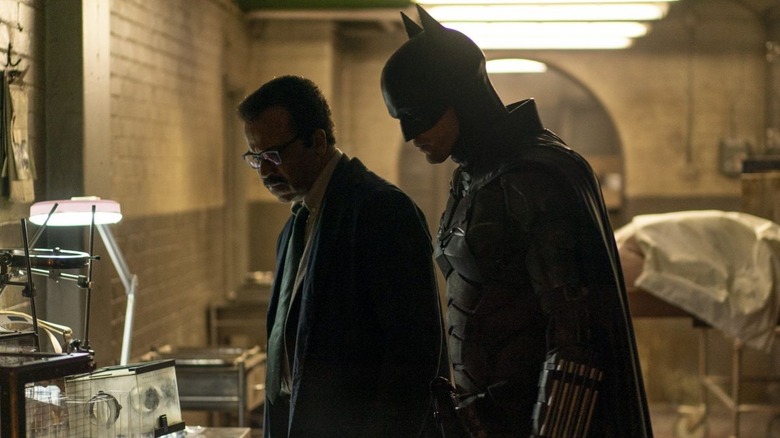The Batman Finally Makes Batman And Gordon Best Friends Forever
Jim Gordon has always been a big part of Batman's life. After all, he appears in the very first panel of the very first Batman story in "Detective Comics" #27, back in 1939. Since then, Gordon and Bruce Wayne have been inextricably linked, going through a lot of pain and tough moments together, from Joker shooting Barbara Gordon, to James Gordon, Jr.'s serial killing spree, to the "No Man's Land" storyline, and more.
But while they've always been close co-workers, Matt Reeves' "The Batman" does something different than previous movies — it turns Gordon into Batman's best friend. Sure, Batman has other allies, from Alfred and Robin, to Catwoman and even Harvey Dent, but they are not his friends. By turning the Gordon/Batman dynamic into more of a friendship, it makes the film's portrayal of Batman as a recluse even better, and it provides plenty of delightful banter between two old pals.
The bat and the stache
Every movie about Batman includes a Jim Gordon, and they all tend to include at least one scene where the two meet at the rooftop of the GCPD building and talk shop. Gordon, of course, needs Batman because he can operate outside of bureaucracy, and Batman needs Gordon's access to crime scenes and police intel. These scenes often play more like a detective talking to his informant, very official and straight to the point.
That is not the case with "The Batman." Their rapport is much more casual, and they talk as if they were the only two people who know each other at a party. Take the very first time we see Gordon, at the crime scene at the mayor's house. The moment he walks in, with Batman standing behind him, all the cops immediately stare at the big, armored bat-suited man standing behind the detective, but Gordon keeps walking like he knows his date is the hottest person in the room. Likewise, whenever a cop tries to kick Batman out or dismiss him as a vigilante, his pal Jim jumps at his defense.
They even meet outside the rooftop where the Bat-signal is! You have to hand it to Bruce, he is such a considerate friend that when he thinks he's got a clue to the Riddler's next victim, he doesn't try to solve things alone — no, sir! Instead, he calls old Jimmy G. and they go together to catch Penguin. Gordon is not an Inspector Lestrade to Batman's Sherlock Holmes as much as he is his Watson — a professional partner but also his closest friend.
It's all good, man
This relationship just makes Matt Reeves' decision to make Batman a complete Sad Boy recluse with no social skills and no friends all the more effective. This is a film where Bruce Wayne is basically non-existent and the Bat has consumed his life, in which people think of Bruce like a myth almost, and where Batman doesn't even have to show up for criminals to run away in terror. Yet, Gordon is not only unafraid of the Bats, but he constantly refers to him as "man" and "chief."
It's a funny choice, sure, what with Batman being a man dressed as a Bat, and Gordon being an overly serious cop, but it goes deeper than that. It is a very simple thing that infers a much longer history between the two men. The bit where Batman tells Gordon "no guns," only for Gordon to reply "that's your thing, man" is short, but it shows that they have likely discussed this already, that they've had other cases before and have got to know each other for a while. It also shows that Gordon finds Batman's whole deal a bit amusing, and likes to have fun with it.
BBFS: Best bat-friends forever
Matt Reeves' "The Batman" has been called dark, bleak, even scary, but it is also incredibly silly in a way that reminds me of the 1966 "Batman" series. Take for instance the scene where Batman jumps off a building and folds the cape of his suit into something like a flying squirrel ... only to crash against an overpass and get the crap kicked out of him and never attempt it again. Pure 1966 "Batman." Likewise, every moment between Batman and Gordon, especially when Gordon affectionately called Batman "man," only made me think of one thing: "Teen Titans Go!"
The show reimagines the popular DC Comics superhero team as a slapstick comedy, with standalone episodes centered around wild topics ranging from Cyborg being obsessed with a rather catchy song, to actually useful lessons about health insurance, and profitable lessons in equity. Some of the best episodes of the show revolve around Batman and Gordon, here reimagined as small children in bulky adult bodies. They go on movie dates, have sleepovers with Penguin and Joker, and generally try to avoid the wrath of Alfred.
What makes that show's portrayal of Batman so special is that it is an incredibly rare portrayal of Batman being genuinely happy. Bruce Wayne is a superhero who is forever doomed to be unhappy, simply because his crusade can never end. But seeing him able to take a night off and just watch TV with his buddy is delightful. Despite a dark and gritty tone that is much closer to Fincher's "Se7en" than Joel Schumacher's "Batman & Robin," Reeves' "The Batman" does bring us close to "Teen Titans Go!" and a happy Batman.
Just watch the scene where Gordon and Batman have to a fake fight in order to allow the Dark Knight to escape a police precinct full of cops that want to bring him down. Gordon having to whisper instructions to Batman while having to show anger in his facial expressions feels like a "Key & Peele" sketch, and when Gordon asks Batman to punch him, he almost chuckles (a first for him, most likely). Really, when Gordon later tells Batman, "You could have pulled your punch!" only for him to reply "I did" is the closest Batman has come to making jokes in years, and the fact he only does that with Gordon is special.
The ending to "The Batman" implies that any future sequel will bring Bruce Wayne closer to the billionaire playboy we know and love, but I sure hope any future sequel continues to develop the best friendship in the film, the Bat and the Stache.


